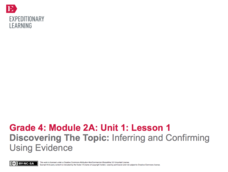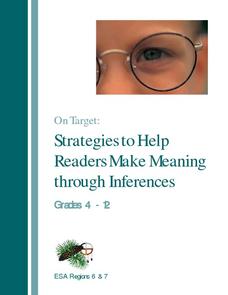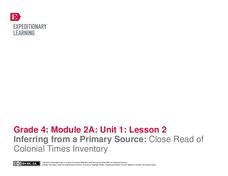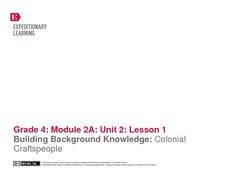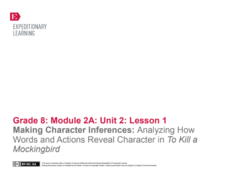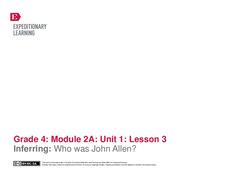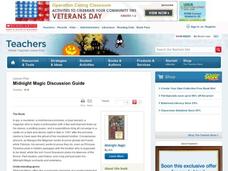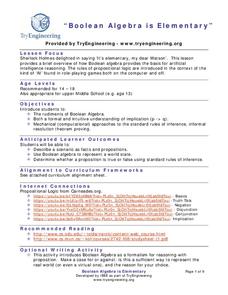Curated OER
Mini-Lesson Planning for Inferences
Making inferences and drawing conclusions is a key component to successful active reading. Encourage your class to use context clues and prior knowledge to infer different elements of a story, including the setting, plot, and character...
EngageNY
Discovering the Topic: Inferring and Confirming Using Evidence
Allow your class to figure out what they will be studying through an inquiry-based anticipatory set that involves analysis of mystery documents and practice with making inferences. The lesson plan document includes a detailed description...
EngageNY
Taking Notes Using a Graphic Organizer: Inferring About Work and Play in Colonial America
What was life like in colonial America? Follow this lesson and your pupils will find out what people in colonial times did for work and for fun. Ask learners to compare and contrast the two texts and explain what the reading helped them...
Curated OER
Using Random Sampling to Draw Inferences
Emerging statisticians develop the ability to make inferences from sample data while also working on proportional relationships in general. Here, young learners examine samples for bias, and then use random samples to make...
EngageNY
Inferring about Character: Getting to Know Percy (Chapters 1 and 2)
What a character! Scholars look at two chapters in The Lightning Thief to make inferences about the character Percy. They record both the character's challenges and responses. Learners then work in their triads to discuss the gist...
EngageNY
Building Background Knowledge and Making Inferences: What Is a Natural Disaster?
That's a disaster! Scholars complete a gallery walk to view images and make inferences about natural disasters. They fill out a note catcher about what they observe and infer any questions they may have. They then participate in a World...
Curated OER
On Target: Strategies to Help Readers Make Meaning through Inferences
Here's a resource that explicitly teaches, models, and provides readers with opportunities to practice the process of drawing inferences from text. Packed with strategies elementary, middle, and high school teachers can use, the resource...
Curated OER
What Can We Learn From the Past?
What would future archeologists learn from your scholars' personal belongings? Have them bring in a box of "primary sources" from their home. Discuss the difference between observations and inference, using some of your own items to...
EngageNY
Inferring from a Primary Source: Close Read of Colonial Times Inventory
Teach your class about colonial America through an examination of primary documents. First though, start vocabulary notebooks for content-specific and academic vocabulary. Pupils can keep this record during the entire module. Once this...
EngageNY
Building Background Knowledge: Colonial Craftspeople
In the first lesson plan of this unit on colonial trade, fourth graders gain background knowledge of different jobs performed by early colonists. The class begins with a slide show presentation that includes a variety of great...
Academy of American Poets
Teach This Poem: "In the Next Galaxy" by Ruth Stone
Imagine what life might be like in a different galaxy. That's the challenge young scientists take on in a warm-up activity designed to prepare them for a close reading of Ruth Stone's poem "In the Next Galaxy." After class members share...
EngageNY
Making Character Inferences: Analyzing How Words and Actions Reveal Character in To Kill a Mockingbird
Partner up! After an I have/who has activity, readers partner with one of their discussion appointments to add evidence from chapters 11-13 in To Kill a Mockingbird to the Atticus Note-catcher. Partners then share with the class and add...
Teaching Tolerance
Using Photographs to Teach Social Justice | Legal Action: The Supreme Court
A social justice lesson focuses on the Supreme Court case Loving v. Virginia which struck down laws that prohibited marriages between African Americans and white Americans. The lesson begins with class members examining a photograph of...
EngageNY
Learning About Farms in Colonial America: Explicit vs. Inferred Information
Aid your pupils in understanding the terms explicit and inferred while teaching them about colonial farmers. The third activity in the module builds off the previous activity and focuses heavily on inference. Learners analyze a...
Curated OER
High Wire Magazine: Turning Points
Develop and strengthen reading comprehension strategies through this comprehensive teaching guide. Your learners will practice making text connections, inferences, predictions, and more using reading passages from the teen-appropriate...
EduGAINs
Data Management
Using a carousel activity, class members gain an understanding of the idea of inferences by using pictures then connecting them to mathematics. Groups discuss their individual problems prior to sharing them with the entire class....
EngageNY
Inferring: Who was John Allen?
Help your learners work with difficult or archaic words. A continuation of lesson two of this module, the plan here focuses on deciphering the Inventory of John Allen, in particular the unfamiliar words that make up much of the list. Add...
EngageNY
Analyzing Character: Understanding Atticus (Chapter 1, cont.)
Scholars use a Note-catcher to gather text evidence to reveal the character of Atticus Finch in To Kill a Mockingbird. After collecting evidence, they work with a partner to make an inference about the character and then share their...
EngageNY
Reading and Taking Notes on Colonial Trades
In the tenth instructional activity of this unit, young scholars learn to categorize information as they continue researching their colonial trade. During guided practice, the teacher models how to read informational text slowly while...
Scholastic
Midnight Magic Discussion Guide
This discussion guide accompanies the fiction book Midnight Magic written by Avi, enforces story elements, inferences, and theme/plot. Have the class work on it over time, it will engage even your reluctant readers.
EngageNY
Inferring about Character: Analyzing and Discussing Points of View (Chapter 2)
Welcome to the World Café! Readers discuss A Long Walk to Water by Linda Sue Park. They circulate throughout the classroom, stopping at different tables to answer a discussion prompt with their classmates and record their ideas on a chart.
TryEngineering
Boolean Algebra is Elementary
See how Boolean algebra relates to video games with a lesson that teaches young scholars how to use Boolean algebra to create rules for a virtual world. They test the rule base for consistency in groups.
Curated OER
Book Discussions in a Reading Partnership
Do you have a lot of different reading levels in your class? Pair kids up by level and have them choose a book to read independently. They will make predictions, ask questions, make connections, etc. Consider creating a general reading...
NOAA
Journey to the Unknown
What's it like to be a deep-sea explorer? Tap into the imaginations of your fifth and sixth graders with a vivid instructional activity, the second part of a six-part adventure. Learners close their eyes and submerge themselves in an...
Other popular searches
- Teaching Inference Skills
- Teaching Inference Reading
- Teaching Inference Implicit
- Teaching Inference 2nd
- Teaching Inference +Reading

